
Call for applications for a 3 years doctoral contract
For the ERC GREENLOSS Project - Application deadline: May 17, 2026
📢 JOB ALERT! Fully funded 3-year PhD in Climate & Comparative Politics at @sciencespo-cee.bsky.social. Starting in September.
The project is on the political consequences of climate policies in carbon-intensive communities across Europe.
🗓 Deadline: May 17
www.sciencespo.fr/centre-etude...
24.02.2026 10:37 —
👍 52
🔁 45
💬 0
📌 2
Congratulations, Nadja! 🥳 It was indeed a fantastic course! @na-wehl.bsky.social
25.02.2026 23:33 —
👍 2
🔁 0
💬 1
📌 0

𝐃𝐢𝐞 2. 𝐖𝐞𝐥𝐥𝐞 𝐝𝐞𝐫 𝟐𝟎 𝐌𝐢𝐧𝐮𝐭𝐞𝐧-/𝐓𝐚𝐦𝐞𝐝𝐢𝐚-𝐀𝐛𝐬𝐭𝐢𝐦𝐦𝐮𝐧𝐠𝐬𝐮𝐦𝐟𝐫𝐚𝐠𝐞 𝐯𝐨𝐧 𝐋𝐞𝐞𝐖𝐚𝐬 𝐢𝐬𝐭 𝐝𝐚 (𝟒/𝟒)
Die 𝐄𝐢𝐧𝐟𝐮̈𝐡𝐫𝐮𝐧𝐠 𝐝𝐞𝐫 𝐈𝐧𝐝𝐢𝐯𝐢𝐝𝐮𝐚𝐥𝐛𝐞𝐬𝐭𝐞𝐮𝐞𝐫𝐮𝐧𝐠 wird von einer Mehrheit der Stimmberechtigten befürwortet (53% Ja bei 44% Nein und 3% ohne Angabe).
cc @20min.ch @lucasleemann.bsky.social @mariostauble.bsky.social
25.02.2026 06:04 —
👍 3
🔁 2
💬 0
📌 2

🚨 New WP w/ @leonardocarella.bsky.social on OSF
doi.org/10.31235/osf...
We usually think that social identities precede preferences
We show the reverse is also true: people update their social identities to match their immigration preferences
Focus: class identity in 🇬🇧 + Christian identity in 🇮🇹
23.02.2026 10:57 —
👍 126
🔁 56
💬 3
📌 5
Very glad that our first DEMNORM paper found such a great home at @thejop.bsky.social. If you’re interested in the role of social desirability in online surveys, check out the thread and paper below ⬇️
13.02.2026 08:32 —
👍 23
🔁 7
💬 1
📌 0


🚨 Join us for the next edition Summer School for Women* in Political Methodology in Mannheim 🚨
7 days of hands-on advanced methods + networking for PhDs, postdocs & early-career researchers.
Free of charge (limited travel support).
Deadline 1 March 2026: summerschoolwpm.org
#methodsky #polisky
02.02.2026 13:13 —
👍 78
🔁 64
💬 1
📌 15

Offene Stellen / Open Positions
🚨Job alert 🚨
I have an opening for a postdoc in my team at @ipz.bsky.social in the area of digital democracy starting Sep 1, 2026.
If you are working on the impact of the digital transformation on politics, please apply by 🗓️ Mar 1, 2026.
📤 Please share widely!
www.ipz.uzh.ch/de/ueber-uns...
31.01.2026 21:26 —
👍 54
🔁 70
💬 2
📌 2

💻 Who actually wants “digitalisation”?
Alexander Kuo, @retobuergisser.bsky.social, @ainagallego.bsky.social, @siljahausermann.bsky.social survey five EU countries and find a clear mainstream-populist divide in support for digitalisation policies 👇
🔗 www.tandfonline.com/doi/full/10....
29.01.2026 18:15 —
👍 9
🔁 5
💬 0
📌 0
From context to congruence: Immigration salience and voter socialization | European Journal of Political Research | Cambridge Core
From context to congruence: Immigration salience and voter socialization
🚨Happy to finally see this out in the @ejprjournal.bsky.social (with @leonardocarella.bsky.social)
⁉️ Does growing up when immigration is salient make people vote for parties they agree with on immigration *for the rest of their lives*?
doi.org/10.1017/S147...
27.01.2026 08:17 —
👍 74
🔁 38
💬 1
📌 0

New Publication with @lhaffert.bsky.social in @ejprjournal.bsky.social!
We study the role of generations in the urban-rural divide, which is increasingly shaping the politics of many democracies.
Studying Switzerland, we show: The urban-rural divide is stronger among younger generations. (1/10) 🧵👇
24.11.2025 09:47 —
👍 120
🔁 46
💬 2
📌 3

Abstract
It is widely accepted in political science – and remarkably established in public discourse – that status anxieties fuel a far right backlash against progressive politics. This narrative suggests that right-wing conservatives perceive the status of women, racial, or sexual minorities as threatening. Using open-ended survey questions fielded in Germany, we show that women and minorities indeed figure in people’s perceptions of status hierarchies, but in very specific ways: First, overall, people still perceive status as largely socioeconomically determined. Second, sociocultural groups figure in perceptions of who is gaining/losing status, less so in perceptions of the top/bottom of society. Third, more than conservative voters, it is social progressives who mention women and minorities as “winners”. While on race/ethnicity, we find evidence for a backlash, on gender and sexuality we find more evidence for a progressive momentum. This matters for progressive politics today and for how we empirically study status concerns.
New article out in @cpsjournal.bsky.social with Tabea Palmtag and @dpzollinger.bsky.social 📝
We use open-ended survey questions (in Germany) to assess how and among whom social status shifts are perceived. This tests cultural backlash narratives in voters' perceptions.
🔗 doi.org/10.1177/0010...
20.11.2025 15:35 —
👍 119
🔁 45
💬 3
📌 4

With the Progressive Politics Research Network, we have published 8 new research briefs on the politics of housing. What does a progressive agenda on housing look like? Which elements are important? What the hurdles are and how can they be overcome?
politicscentre.nuffield.ox.ac.uk/progressive-...
27.11.2025 08:01 —
👍 127
🔁 54
💬 1
📌 10
🔔Job Alert 🔔
Thrilled to share that @stefaniebailer.bsky.social and I have been awarded 1.5 million CHF in SNSF funding for our new project: “Electoral choice: Which role does legislators’ quality play?”
We’re recruiting 1 postdoc and 2 PhD candidates to join us in Basel and Geneva!
25.11.2025 09:33 —
👍 103
🔁 54
💬 4
📌 1
PhD Prep Talk: Switzerland
Meet an EUI Researcher and alumnus from your country!
Share widely with your students in Switzerland 🇨🇭thinking about a PhD @eui-eu.bsky.social
𝗢𝗻𝗹𝗶𝗻𝗲 𝗘𝗨𝗜 𝗣𝗵𝗗 𝗣𝗿𝗲𝗽 𝗧𝗮𝗹𝗸 🇨🇭
21 Nov 2025 | 2:30pm CET
@alissasiara.bsky.social introduces the program & life at EUI, I share my experience, and we answer your questions.
👉 Register: www.eui.eu/events?id=58...
05.11.2025 12:14 —
👍 27
🔁 24
💬 2
📌 0
Congrats, Sara! 🥳🥳
10.11.2025 10:13 —
👍 1
🔁 0
💬 0
📌 0
Educational Networks, Social Closure, and Cleavage Stabilization | British Journal of Political Science | Cambridge Core
Educational Networks, Social Closure, and Cleavage Stabilization - Volume 55
How are contemporary cleavage structures stabilized in times of declining mass social and political organizations?
In this new paper with @davidattewell6.bsky.social @bjpols.bsky.social, we suggest that homogeneous social (educational) networks provide part of the answer.
tinyurl.com/49cs8jwp
06.11.2025 08:28 —
👍 67
🔁 32
💬 1
📌 2

BJPolS abstract discussing the dynamic between knowledge economy migration and political shifts in Germany, specifically addressing urban versus rural opportunities and its implications on political perspectives and migration trends.
NEW -
Seeking Opportunity in the Knowledge Economy: Moving Places, Moving Politics? - https://cup.org/3LgxVos
"moving to opportunity results in... more left-leaning self-identification, and lower support for far-right parties"
- @valentinaconsiglio.bsky.social & @thmskrr.bsky.social
#OpenAccess
30.10.2025 08:50 —
👍 30
🔁 26
💬 1
📌 0
@dpzollinger.bsky.social and I are thrilled "Cleavage Politics in Western Democracies" is out as an SI at @wepsocial.bsky.social!
Its papers explore the foundations of the cleavage pitting new left against radical right parties, and how it compares to the classic cleavages of Lipset & Rokkan:
🧵⬇️
07.10.2025 11:27 —
👍 118
🔁 57
💬 4
📌 8


🚨📢 I am hiring a PhD candidate /research assistant in Swiss Politics and/or Comparative Politics (100%)!
🚨📢 Je recrute un·e assistant·e diplômé·e en science politique en politique suisse et comparée!
Please join me @unil.bsky.social, Switzerland!
Thanks for sharing! polisky @sspunil.bsky.social
19.09.2025 08:07 —
👍 47
🔁 42
💬 2
📌 1
Ever asked yourself how to detect and extract social groups from texts with computational social science? @haukelicht.bsky.social and me have a solution for you out at @bjpols.bsky.social. You can also find the pre-trained models on huggingface!
01.09.2025 15:46 —
👍 94
🔁 32
💬 2
📌 1

Social Mobility, Self‐Selection, and the Persistence of Class Inequality in Electoral Participation
In recent decades, non-voting among the British working class has increased substantially, contributing to widening class-based inequality in electoral participation. This study examines the impact o...
Class-based gaps in voter turnout and political representation in Britain are likely to widen further. Our study, with Nan Dirk de Graaf and Geoff Evans (@nuffieldcollege.bsky.social), reveals how social mobility creates a cycle that reinforces democratic inequalities. 🗳️🪜
26.08.2025 07:50 —
👍 19
🔁 8
💬 1
📌 0

Gender parity does not signal to men that institutions address their interests less. However, once men are under-represented, they perceive a reduction in output generated in their favor. Furthermore, men, on average, perceive gender parity as the fairest scenario. 5/9
14.08.2025 15:27 —
👍 6
🔁 1
💬 1
📌 1

Do men see gender parity in representation as detrimental to their interests? What about when women’s representation exceeds parity? And how do such shifts affect men’s fairness perceptions? I address these questions in my article, now published in PRQ. 1/9
doi.org/10.1177/1065...
14.08.2025 15:27 —
👍 88
🔁 36
💬 5
📌 2
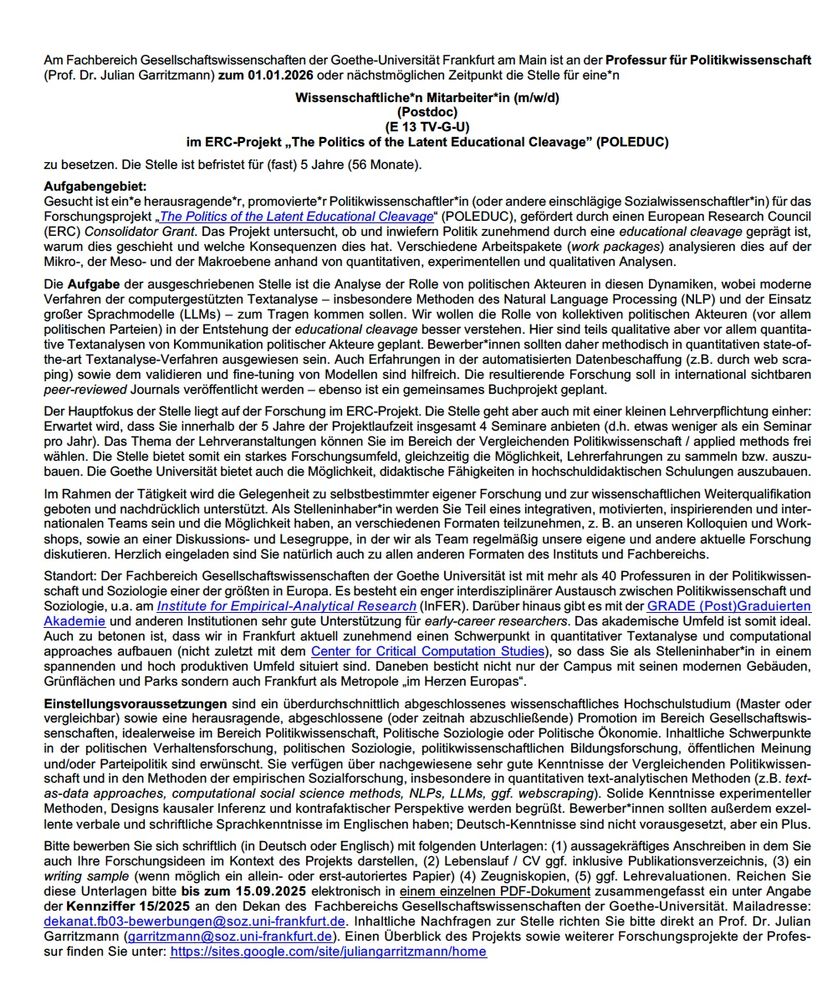
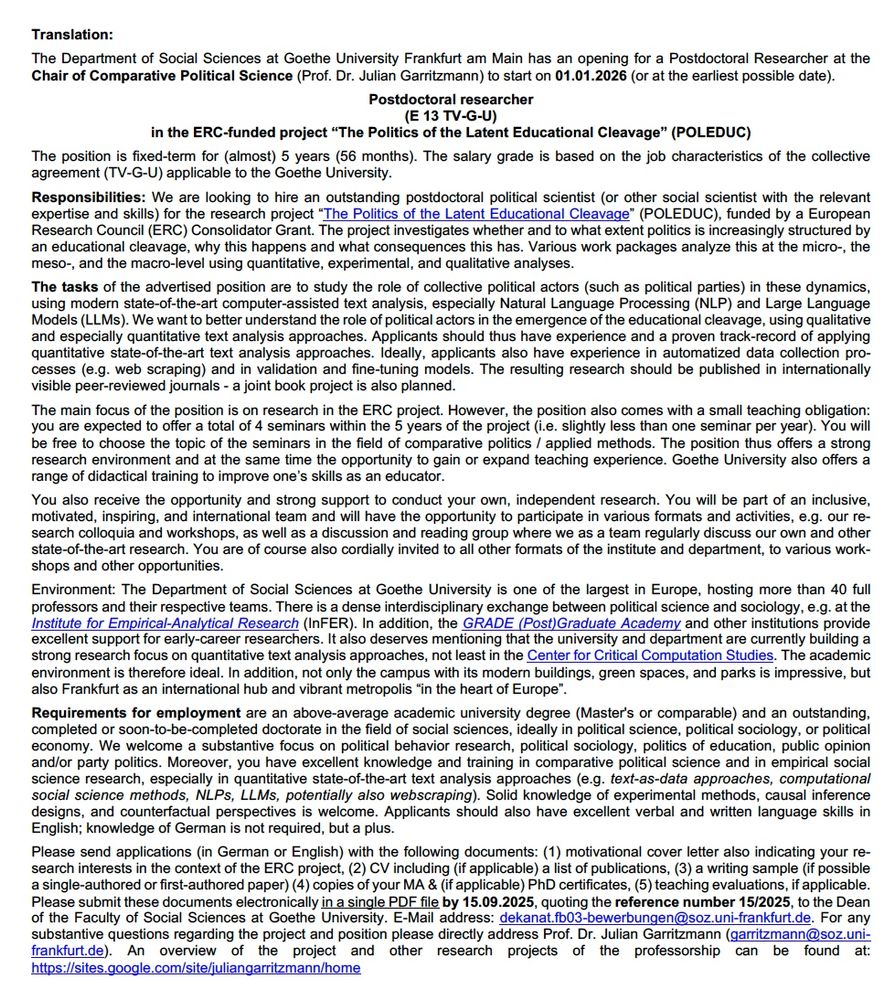
I'm hiring another postdoc (research-focused, for almost 5 years) for my @erc.europa.eu project on the educational cleavage!
I'm looking for someone with strong quantitative text-analysis skills (e.g. #NLP, #LLM, etc.) to study the role of political actors in cleavage formation.
25.07.2025 12:37 —
👍 90
🔁 74
💬 1
📌 4
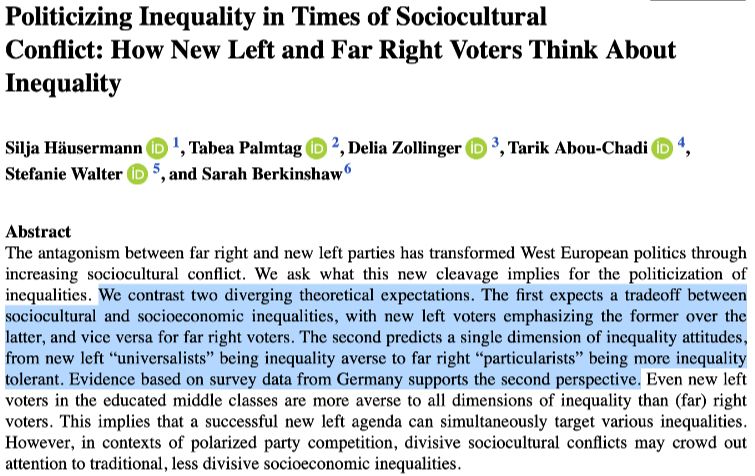
Even in times of sociocultural conflict, a progressive left electorate is more averse to sociocultural *and* socioeconomic inequalities than (far) right voters.
New paper with @siljahausermann.bsky.social Palmtag @tabouchadi.bsky.social @stefwalter.bsky.social Berkinshaw
tinyurl.com/d42wyb79
1/n
29.07.2025 12:19 —
👍 89
🔁 32
💬 4
📌 1
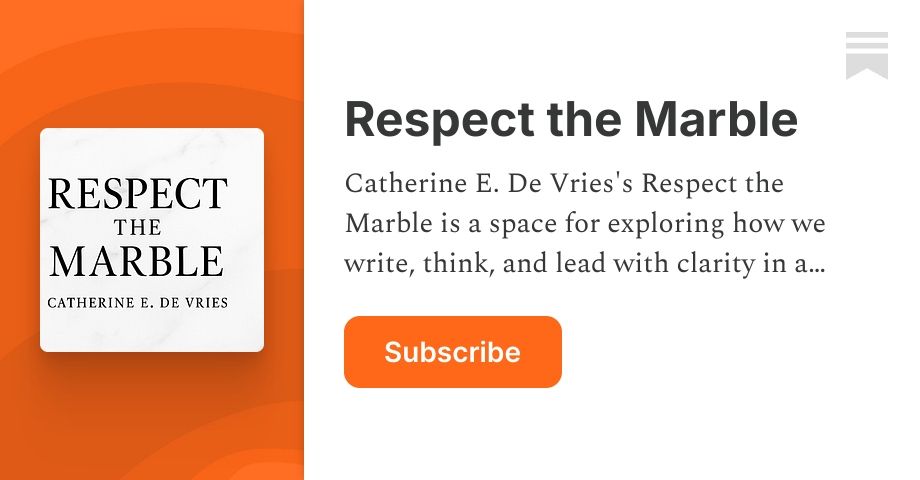
You’ve Got the Ideas. What If It’s Your Voice That’s Not Landing?
The Hidden Curriculum of Academic Writing
Voice is one of the most talked-about, and least explained, aspects of academic writing.
We’re told to “find it,” but rarely taught how to build it.
I wrote up some reflections here:
👉 open.substack.com/pub/catherin...
A 🧵 about why so much academic writing feels voiceless & what to do about it.
15.07.2025 07:47 —
👍 71
🔁 21
💬 3
📌 6
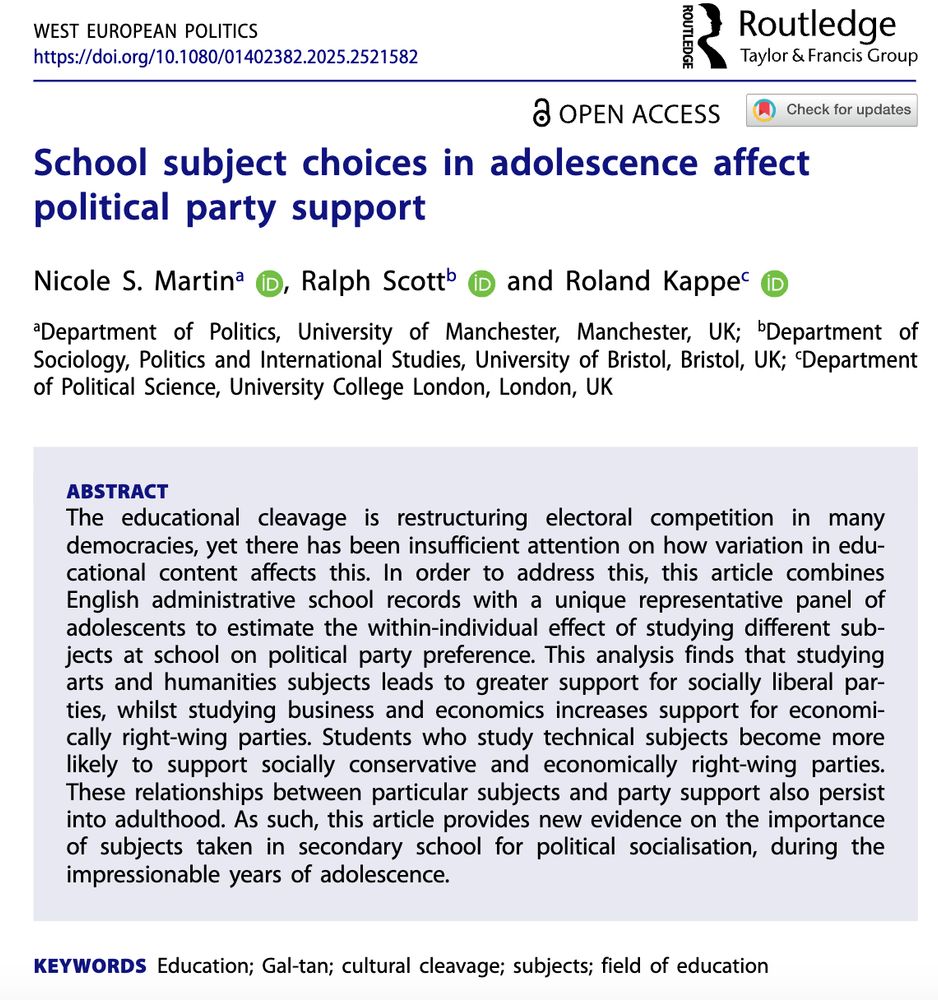
Article abstract, which says:
The educational cleavage is restructuring electoral competition in many democracies, yet there has been insufficient attention on how variation in educational content affects this. In order to address this, this article combines English administrative school records with a unique representative panel of adolescents to estimate the within-individual effect of studying different subjects at school on political party preference. This analysis finds that studying arts and humanities subjects leads to greater support for socially liberal parties, whilst studying business and economics increases support for economically right-wing parties. Students who study technical subjects become more likely to support socially conservative and economically right-wing parties. These relationships between particular subjects and party support also persist into adulthood. As such, this article provides new evidence on the importance of subjects taken in secondary school for political socialisation, during the impressionable years of adolescence.
📣 NEW PAPER ALERT! 🚨
"School subject choices in adolescence affect political party support"
Just published in @wepsocial.bsky.social with @nspmartin.bsky.social and @rolandkappe.bsky.social.
doi.org/10.1080/0140...
🧵👇
14.07.2025 13:13 —
👍 80
🔁 45
💬 5
📌 4
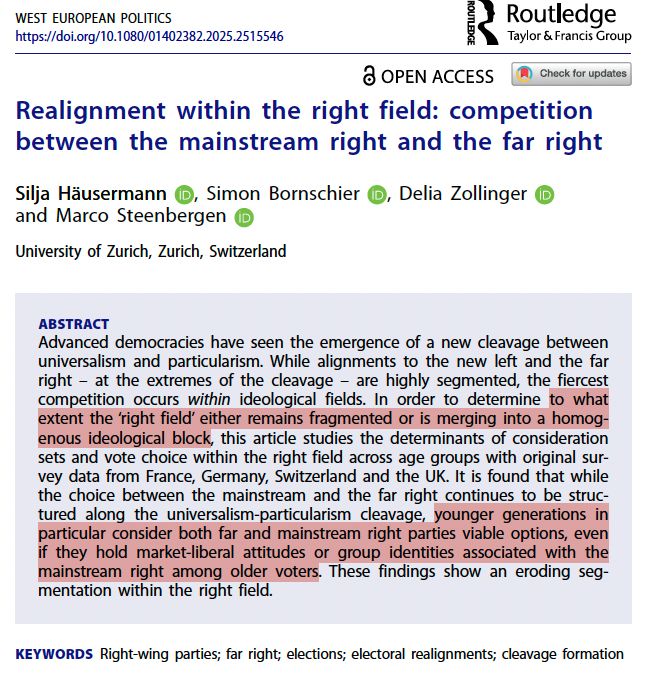
❗The segmentation of the right field is eroding, especially among young voters❗
New article out by @simonbornschier.bsky.social @dpzollinger.bsky.social
@mrsteenbergen.bsky.social and myself
@ipz.bsky.social @wepsocial.bsky.social
tinyurl.com/ycxfx2aj
A short 🧵
1/7
07.07.2025 18:19 —
👍 155
🔁 59
💬 5
📌 2























